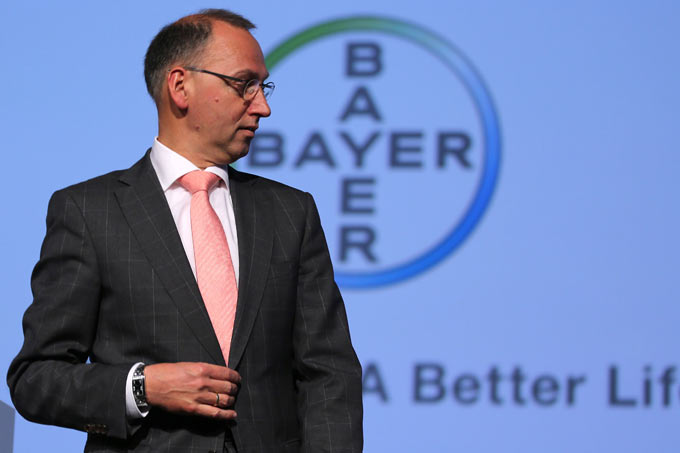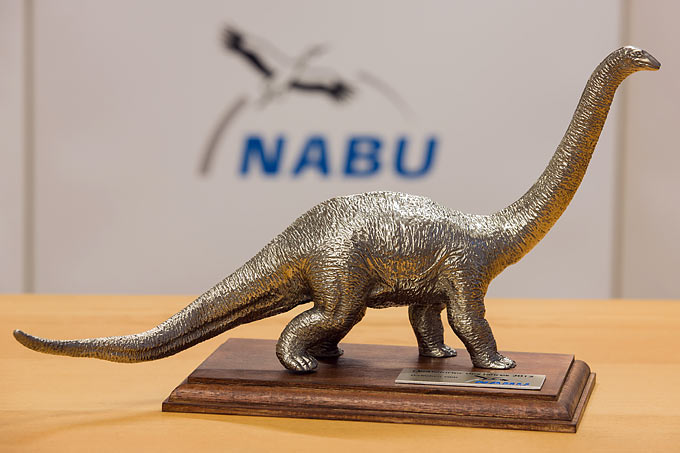Business model Bayer-Monsanto means loss of biodiversity
Bayer CEO Werner Baumann receives "Dinosaur of the Year 2016" award

Werner Baumann - Photo: Oliver Berg/dpa
This year, Germany's most embarrassing environmental award, the "Dinosaur of the Year 2016", goes to the CEO of Bayer AG, Werner Baumann. The 66 billion dollar record takeover of the US mega supplier of seeds, orchestrated by the Bayer CEO Baumann, stands in conflict with the demands of environmentalists and consumers throughout the world who want farming that is environmentally safe, and free of toxic substances and genetic modification.
"The Bayer-Monsanto business model benefits from an industrial agriculture that is based on anachronistic support structures and that is artificially kept running using public funds. Doing so will contribute to these systems further manifesting themselves along with their damaging consequences for humans and nature. In addition, it is expected that dependency of farmers worldwide will increase further because of the leading market power of Bayer-Monsanto in the seed and pesticide sectors. In contrast, seed diversity may shrink worldwide," said NABU President Olaf Tschimpke. The strategy of "everything from a single source" through supplying seeds and pesticides tailored to each other not only makes farmers increasingly dependent but also expedites intensive farming, which is regarded as the main cause of global biodiversity loss. "The massive use of pesticides leads to a decline of insect populations, among which are also useful pollinators such as wild bees and butterflies, deprives farmland birds of their livelihood and poisons living things that rely on water," added Tschimpke. This is why the fusion would also devastate the sustainability goals set by the United Nations, which also touch on biodiversity.
Former award winners
- 2015: Philipp zu Guttenberg, President of the German Forestry Owners‘ Federation (AGDW)
- 2014: Gernot Kalkoffen, Head of ExxonMobil Europe
- 2013: Wolfgang Burgard, Managing Director of the Beverage Packagings of the Future Association (BGVZ)
- 2012: Ilse Aigner (CSU), Federal Minister for Food and Agriculture
- 2011: Michael Thamm, President of AIDA Cruises, and Richard J. Vogel, CEO of TUI Cruises
- 2010: Jürgen Großmann, Chairman of RWE AG
- 2009: Hans-Werner Sinn, Economist and President of Ifo Institute Munich
- 2008: Michael Glos (CSU), Federal Minister for Economic Affairs
- 2007: Joachim Hunold, Founder and CEO of Air Berlin
- 2006: Harry Roels, Chairman of RWE AG
- 2005: Ludwig Georg Braun, President oft the Association of German Chambers of Commerce and Industry (DIHK)
- 2003 and 2004: no Dinosaur Awards
- 2002: Gerhard Goll, Chairman oft Energy Baden-Württemberg (EnBW)
- 2001: Gerhard Sonnleitner, President oft the German Farmers‘ Association (DBV)
- 2000: Lee R. Raymond, CEO of ExxonMobil
- 1999: Erwin Teufel (CDU), Prime Minister of Baden-Württemberg
- 1998: Otto Majewski, CEO of Bayernwerk AG
- 1997: Theo Waigel (CSU), Federal Minister of Finance
- 1996: Günter Rexrodt (FDP), Federal Minister for Economic Affairs
- 1995: Hans-Olaf Henkel, President of the Federation of German Industries (BDI)
- 1994: Conrad-Michael Lehment (FDP), Minister for Transport of Mecklenburg-Vorpommern
- 1993: Reinhold Kopp (SPD), Minister for Economic Affairs of Saarland
Bayer and Monsanto together control around one fourth of the pesticide market worldwide. Their combined share of the worldwide seed market is almost 30 per cent. This development is especially evident taking soybean farming in the US as an example: After purchasing Monsanto, Bayer would own close to 100 per cent of the genetically modified seeds grown there; for maize, this figure lies at around 75 per cent.
In NABU's view, the danger of this monopoly consists in the fact that in future Bayer and Monsanto – a leading company in the area of "digital farming" – could have at their disposal enormous amounts of data concerning soils, fertiliser amounts, seed mixtures and pesticides; this may allow them to have massive influence on agricultural production from Europe to Africa to South America. It is also unclear what is going to happen to the significant amounts of data gathered by Bayer and Monsanto during their programmes.
NABU is now placing all its hopes on the relevant cartel authorities, which could still put a stop to the takeover. "We appeal to the EU Commissioner for Competition Margrethe Vestager to closely review the takeover and stop the fusion, keeping in mind the biodiversity, farmers and consumers in Europe," said Tschimpke.
For further enquiries: Kathrin Klinkusch, NABU Press Officer, Tel. +49 (0)30.284984-1510, Mobile +49 (0)173.9306515, Kathrin.Klinkusch@NABU.de. Free press images of the dinosaur trophy and images on agriculture.
More about NABU'S Dinosaur Award (in German)
Mit dem „Dinosaurier des Jahres“ zeichnet der NABU seit über 30 Jahren Persönlichkeiten oder Projekte aus, die sich in Sachen Umweltschutz als besonders rückwärtsgewandt und schädlich erwiesen haben. more →

